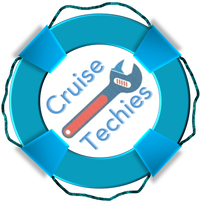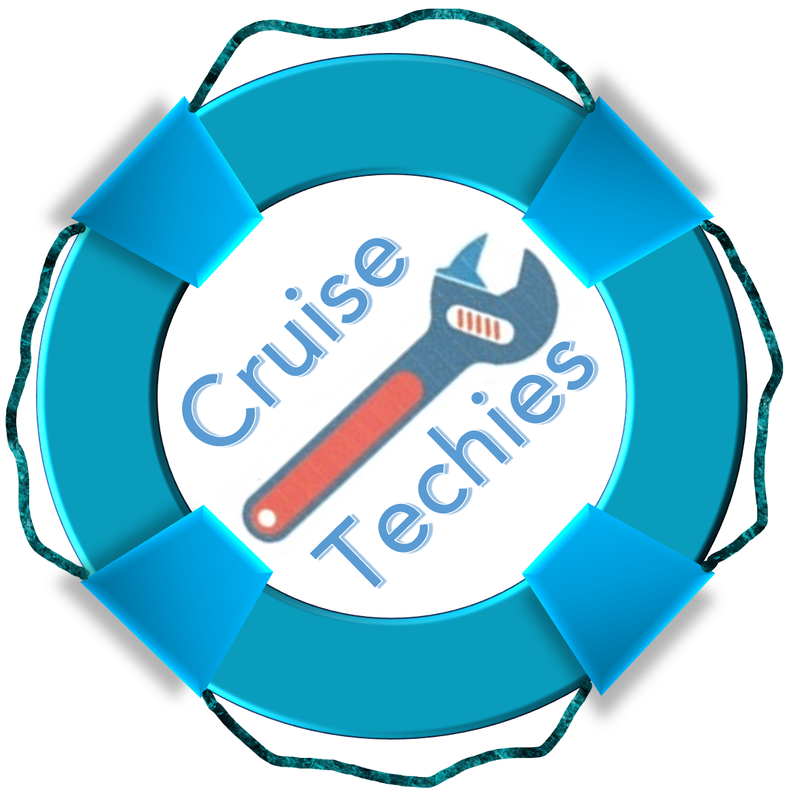 In many ways, stage managing a show on a ship is the same as stage managing a show in high school or university, or any other land-based theatre. You manage the rehearsals and tech week, make sure the cast is in places, call the cues. But in some ways, there are differences. SHORESIDE TO ONBOARD
For a start, a show on a ship doesn’t rehearse on the ship. There’s no time and no space. So they will do all of their rehearsals on land. Typically the land-based stage manager will start with the cast rehearsing the show in the studios. They not only manage the rehearsals, scheduling and making sure the space is set up like it will be on the ship, but also they can be in charge of getting the cast’s flight information to them, making sure they have what they need when they arrive, making sure the cast is settled into their accommodations, and possibly providing transport for them to the rehearsal space. If this is the case, essentially the stage manager also acts as the Company Manager. In some cases this land-based stage manager, called the IPSM (the Install Production Stage Manager) at Norwegian Cruise Lines, will not only be with the cast throughout the rehearsal process, but will also be with them for the first week of “install” on the ship – which is what we landlubbers call “tech week”. Sometimes the IPSM is the same as the onboard PSM, and will continue to stay with the cast. Sometimes the IPSM leaves the cast at that time and starts working with the cast for the next show. The PSM (Production Stage Manager) on board the ship manages the production shows in the theatre space – typically not the other venues. If the PSM has already been with the ship when the new cast comes in, they will be learning the show from the IPSM who has been with the show on land. If the IPSM stays with the cast when they transfer to the ship, they are ahead of the game because they already know the show. In that case, the IPSM focuses on getting their show installed, while the existing PSM starts making arrangements for their cast to leave the ship. In either case, there are adjustments to be made once on board the ship. Changes to the blocking and set moving may have to be made because of heights or entrances not being as anticipated. Plus the cast not only has to get used to the new space, but also has to get used to the rocking of the ship(!). CALLING CUES If you’re coming from an educational or community theatre background, you’ll find that there are a lot of differences when calling cues for a large production on a ship (the same would be true of managing a large production on land). If you’re use to calling lights and sound with around 100 cues, you might be in for a shock. In the case of “Jersey Boys” on board the Norwegian Bliss, there were 752 lighting and automation (moving set pieces) cues. There were 40 cues alone in the first two pages of the script. The audio technician does all of their own cues, which is approximately another 400 cues. Then, the followspot ops have their own person calling their cues, because one SM cannot possibly even speak fast enough to call every single cue in the show. Because there are so many light cues, the stage manager doesn’t always have time to call warnings and/or standbys for them. The light board op has to be on the ball, because the stage manager will simply call out the Go for the cue number. In the case of “calling” the cues for the automation technician, the PSM will give stand-bys, but because the PSM is verbally calling so many light cues, they don’t have time to even speak the automation cues, so they “call” warnings and cues with a light system. Turning a cue light on indicates a warning, and when the cue light goes off, the automation technician triggers the set piece to move. An important part of the PSM’s job is to keep their eyes on everything, especially in the case of the automated sets. They can’t trigger the cue until they’re sure that all of the actors are clear of the set piece or drape. The automation technician, at least in the case of “Jersey Boys”, is sitting on a raised platform off stage left with a bird’s eye view of the stage deck, while the PSM has a monitor in the booth with the view of several camera angles, including that of the camera on the music director in the pit under the stage, so between the two of them they are able to make sure all is clear before each cue goes. CAN YOU CALL THESE CUES? Here, in the words of Abby (the PSM for “Jersey Boys” aboard the Norwegian Bliss), is an example of what it is like to call a series of cues before the song “Sherry”: So while he's [the character Barry Belson] giving that monologue, I'm giving all of the automation standbys for that song. There’s the microphone pallets coming on as one of them. The half black and the fence flying out is another one. And then the turtle - it’s what we call the drum set platform, because it moves like a turtle. So the turtle is coming down stage. So those are the three cues for that. So I say that all while Barry Belson is talking and then the voice starts singing. I'm giving light cues while also pressing the automation buttons to have all of that happen. So I've already said everything, he [the automation technician] knows what it is, he knows that this light is the pallet, this light is the drums, this light is the half black, and so when the lights turn off, he triggers those different things. So I've got to think, okay, I need to make sure I watch that Frankie's out of the way of this, that the music director's cueing this because that's one of my light cues, and also that this light turns off, and I'm turning the page, and I'm waiting for the drums to move, and it's all of those different things, while also thinking, okay, the very next one is Big Girls Don't Cry, and that's another huge one with five different cues. Is stage managing a large production on a ship something you’d like to do? Or perhaps being one of the technicians who makes all those cues happen? If so, check out the links below. NEXT WEEK’S BLISS-FUL TOPIC: Lifestyle; what's it like living on a cruise ship Curious about working on a cruise ship? Check out the Master Class Serious about working on a cruise ship? Check out the Discovery Cruise Don’t forget to check out the Slop Chest for your must-have cruise related apparel, supplies, etc! https://www.cruisetechies.com/slopchest.html
0 Comments
Leave a Reply. |
NO MORE SEARCHING
Your ONE-STOP PORT for information about working in theatres on cruise ships. Here you will find interviews with on board techies, links to cruise techie YouTubers, and useful information about working on cruises. WANT TO FIND OUT MORE ABOUT WORKING ON A CRUISE SHIP?
Check out a Discovery Cruise! Teachers can go on Discovery Cruises, too! Click here LETS BE SHIP MATES!
Categories
All
Archives
June 2024
COMMENT POLICY
ContactComments will be deleted that are: deemed to be spam, profane, offensive, abusive; promotional; not relevant to post; harassing or disrespectful to contributors; anonymous. I reserve the right to edit or delete any comments without notice. This comment policy is subject to change at any time. Contact Us with questions |
CruiseTechies, a division of Rand Consulting and Design LLC


